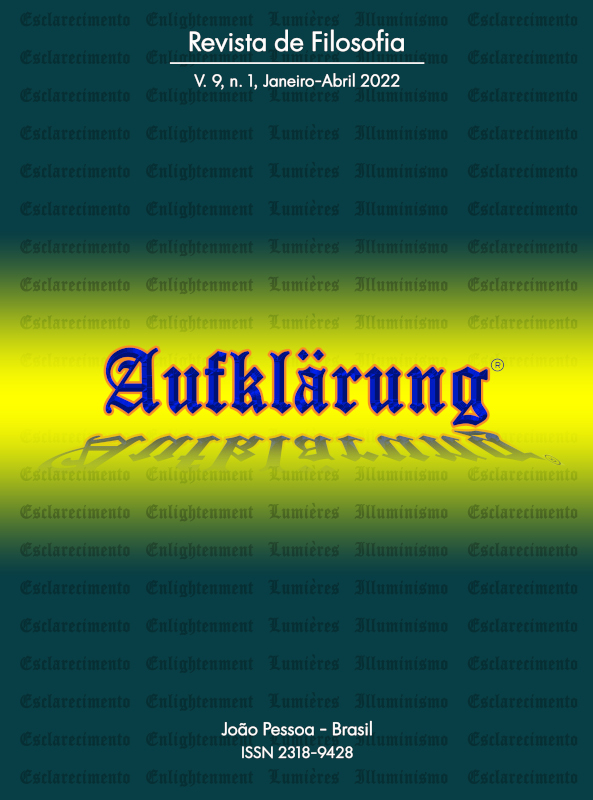The resolution of the surprise test paradox
DOI:
https://doi.org/10.18012/arf.v9i1.61660Keywords:
The surprise test paradox, The prediction paradox, The Moorean approach to the surprise test paradox, The nature of paradoxesAbstract
We will show in this essay that the Moorean approach to the surprise test paradox is not correct and that the clever student's elimination argument hides a subtle error.
Downloads
References
ARISTÓTELES. Órganon: periérmeneias. Lisboa: Guimarães Editores, 1985.
BINKLEY, R. The surprise examination in modal logic. The Journal of Philosophy, v. 65, n. 5, p. 127-136, 1968.
CHIHARA, C. S. Olin, Quine, and the Surprise Examination. Philosophical Studies, v. 47, p. 191-199, 1985.
DE ALMEIDA, C. Racionalidade epistêmica e o paradoxo de Moore. Veritas, v. 54, n. 2, p. 48-73, 2009.
DEROSE, K. Solving the skeptical problem. In: DEROSE, K., WARFIELD, T. A. Skepticism: a contemporary reader.New York: Oxford University Press, p. 183-219, 1999.
HUME, D. Investigação acerca do entendimento humano. E-book. Ed. Acrópolis. Disponível em: http://www.ebooksbrasil.org/adobeebook/hume.pdf. Acesso em: 17/09/2021, 2006
HYDE, D. The sorites paradox. In: RONZITTI, G. Vagueness: a guide. Dordrecht, Heidelberg London and New York: Springer Science & Business Media, p. 1-17, 2011.
KRIPKE, S. Philosophical troubles: collected papers, volume I. Oxford: Oxford University Press, 2011.
LEVY, K. The solution to the surprise exam paradox. The Southern Journal of Philosophy, v. XVII, p. 131-158, 2009.
OLIN, D. Paradox. Chesham: Acumen Press, 2003.
OLIN, D. Predictions, intentions and the prisoner’s dilemma. The Philosophical Quarterly, v. 38, p. 111-116. 1988.
PRIEST, G. What is so bad about contradictions?. The Journal of Philosophy, v. 95, n. 8, p. 410-426, 1998.
QUINE, W. V. O. The ways of paradox and other essays. NY: Randon House, 1966.
QUINE, W. V. O. On a so-called paradox. Mind,, p. 65-67, 1953.
SAINSBURY, R. M. Paradoxes. 3ª ed. NY: Cambridge University Press, 2009.
SORENSEN, R. A. Epistemic paradoxes. In: ZALTA, E. (ed.) Stanford Encyclopedia of Philosophy. Disponível em:. Acesso em: 17 de setembro de 2021, 2006 (com revisão substancial em 2017).
SORENSEN, R. A. The earliest unexpected class inspection. Analysis, v. 53, n. 4, p. 252, 1993.
SORENSEN, R. A. Blindspots. Oxford: Clarendon Press, 1988.
SORENSEN, R.A. Conditional blindspots and the knowledge squeeze: a solution to the prediction paradox. Australasian Journal of Philosophy, v. 62, n. 2, p. 126-135, 1984.
SORENSEN, R. A. Recalcitrant variations of the prediction paradox. Australasian Journal of Philosophy, v. 60, n. 4, p. 355-362, 1982.
VALCARENGHI, E. C. Algumas objeções aos tratamentos de Williams e de De Almeida ao paradoxo de Moore e algumas perspectivas. In.: ALVES, E.; FETT, J. R.; ETCHEVERRY, K. M. (orgs.). Socratically: a festschrift in honor of Claudio de Almeida. Porto Alegre: EDIPUCRS, p. 119-168, 2021.
WILLIAMS, J. N. Moore’s paradox and the priority of belief thesis.Philosophical Studies, v. 165, n. 3, p. 1117-1138, 2013.
WILLIAMS, J. N. Moore’s paradox, Evans’s principle, and iterated beliefs. In: GREEN, M.; WILLIAMS, J. N. (eds.) Moore’s paradox: new essays on belief, rationality, and the first person. New York: Oxford University Press, p. 90-113, 2007.
WILLIAMSON. T. Vagueness. London e New York: Routledge (Taylor & Francis e-Library), 2001.
WILLIAMSON. T. Knowledge and its limits. New York: Oxford University Press, 2000.
WILLIAMSON. T. Inexact knowledge. Mind, v. 101, n. 402, p. 217-242, 1992.
WRIGHT, C.; SUDBURY, A. The paradox of the unexpected examination. Australasian Journal of Philosophy, v. 55, n. 1, p. 41-58, 1977.
Additional Files
Published
How to Cite
Issue
Section
License

This work is licensed under a Creative Commons Attribution 4.0 International License.
Journal general policy
1.This journal works under a Creative Commons License aplied to online journals. That icence can be read in the following link: Creative Commons Attribution 4.0 International (CC BY 4.0).
2.Accordingly to this License, a)the journal declares that authors hold the copyright of their articles without restrictions, and they can archieve them as post-print elsewhere. b)the journal allow the author(s) to retain publishing rights without restrictions.
Metadata Policy for information describing items in the repository
1. Anyone may access the metadata free of charge at anytime.
2.The metadata may be re-used in any medium without prior permission, even commercial purposes provided the OAI Identifier or a link to the original metadata record are given, under the terms of a CC BY license refered for the Journal.







































